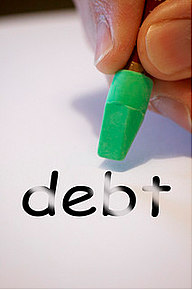Should you pay a "credit repair" company or can you improve or repair your credit report yourself?

Here a some tips on DO IT YOURSELF CREDIT REPAIR:
You have probably seen a TV commercial or pop up ad that claims that "so-n-so credit repair company" can remove:
- negative items from your credit report
- history of late payments
- judgments
- bankruptcy
- charge offs
Sounds like it is "too good to be true", right?
Well, you know the old saying...."if is sounds too good to be true, it probably is"!
Experian, Equifax and TransUnion are the three top independent reporting agencies.
Many people think they are non-profit or government agencies, but they are not.
They collect data and put it in a report to sell for profit! There's nothing wrong with that, but it is important to understand that the credit reporting bureaus are in business to make a profit.
After they gather information about your credit, a report is then sold to creditors, individuals or other companies seeking information about you in order to determine your "credit worthiness".
Here is a quote from a portion of a very good article entitled:
How Credit Scores Affect the Price of Credit and Insurance
Information about you and your credit experiences, like your bill-paying history, the number and type of accounts you have, whether you pay your bills by the date they’re due, collection actions, outstanding debt, and the age of your accounts, is collected from your credit report.
Using a statistical program, creditors compare this information to the loan repayment history of consumers with similar profiles.
For example, a credit scoring system awards points for each factor that helps predict who is most likely to repay a debt. A total number of points — a credit score — helps predict how credit worthy you are — how likely it is that you will repay a loan and make the payments when they’re due.
So what happens when you find out that you have a low or poor credit score due to errors or incorrect information on your credit report?
You could seek the help of a reputable, credit repair company, but be careful!!!!
A good, reputable, credit repair company should not charge exorbitant up-front fees and should only be paid AFTER THE ERROR(S) have been removed.
But why pay for something you could do yourself?
Here's what you can do for yourself:
First, you will need a current credit report.
The law allows all consumers to receive a FREE Credit Report from all 3 of the credit reporting agencies annually.
Click here or go to www.annualcreditreport.com.
NEXT, study your credit report carefully.
Don't be surprised to find errors, such as:
- Balances on accounts you know and can prove that you have paid off
- Judgments that have been satisfied
- Mistakes about your personal information, such as name change, age, social security number, address, etc.
- Accounts that should have been removed because they have exceeded your state's statute of limitations.
- Accounts that you have no idea about and know for certain you never opened
IT IS IMPORTANT TO STATE THAT YOU CANNOT DISPUTE ITEMS THAT ARE LEGITIMATE ON YOUR CREDIT REPORT!
This is called "frivoulous" and could result in you getting into serious trouble!
But, if you find errors or inaccuracies, and have proof that it is indeed an error or the information reporting is inaccurate, you must INITIATE A DISPUTEwith each credit reporting companies.The best way to do this is to go on line and complete each credit reporting agencies form for disputing an error.
Here are the links to the top three credit reporting agencies:
- The credit reporting companies must investigate the items in question and this must be done within 30 days!
- The credit reporting company must forward the date that you provided to the creditor or collection agency reporting the information.
- If the creditor or collection agency cannot dispute your claim, it must notify each of the credit reporting companies to remove the incorrect information from you file.
- Once the investigation is complete, the credit reporting company must send you the results, in writing plus a free copy of your credit report showing the changes have been made.
- You may also request that the credit reporting company send notices of these corrections to anyone who received your credit report in the last 180 days.
However, if you do not have access to a compute to file your dispute on line, then you will need to WRITE A LETTER (CTA) and mail it by CERIFIED REGISTERED MAIL.
After you have initiated the dispute, FOLLOW UP, FOLLOW UP, FOLLOW UP!
Although going online is the best way to initiate a dispute, you may need to call the credit reporting agency directly:
• Equifax 888-202-4025
• Experian 888-397-3742
• TransUnion 800-916-8800
If you absolutly, without a doubt know that the listed accounts is not yours (you never opened and have no idea where it came from), then you can demand that the creditor to VALIDATE THE ACCOUNT.
This is a little different than disputing inaccurate information.
You must write a letter to each of the credit bureaus (Equifax, Experian and TransUnion) and challenge the account asking the original creditor to PROVE that it is valid.
You should enclose a copy (don't send the whole report or original) of the portion of your credit report with the item(s) that you are disputing circle and/or highlighted.
Once again, the credit reporting companies have 30 days to forward and request your dispute.
STAY ON TOP OF YOUR DISPUTE!
Most creditors and/or collection agencies think that the average consumer will not go to all of the trouble to either DISPUTE A DEBT OR REQUEST THAT THE DEBT BE VALIDATED!
One woman in Bend, Oregon won a lawsuit against Equifax of a reported $18.6 Million because Equifax failed to correct her credit report!
But what if you find out that the debts are valid?
You may be able to have them removed due to the statute of limitaions or through DEBT SETTLEMENT for a 50% or more savings!
Photo Credit to Chris Potter and StockMonkeys.com




 If you have an old credit account that has been placed with a collection agency, you may be able to settle that debt for less than the balance.
If you have an old credit account that has been placed with a collection agency, you may be able to settle that debt for less than the balance.

 Your getting calls from a debt collector, but you do not believe you owe the debt.
Your getting calls from a debt collector, but you do not believe you owe the debt.  These days, more than ever, consumers are worried about their credit history and seeking credit help. It’s no wonder with up to 70% of credit reports containing very serious errors.
These days, more than ever, consumers are worried about their credit history and seeking credit help. It’s no wonder with up to 70% of credit reports containing very serious errors. If a debt collector contacts you and claims you owe a debt, how can you make them prove that you still owe it?
If a debt collector contacts you and claims you owe a debt, how can you make them prove that you still owe it?


